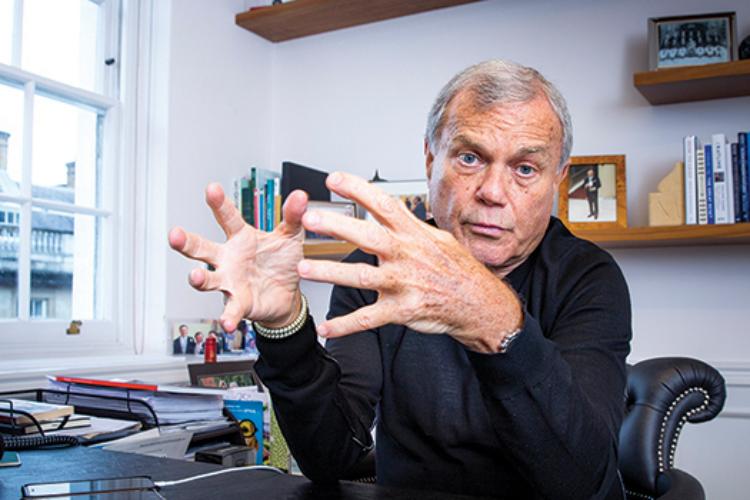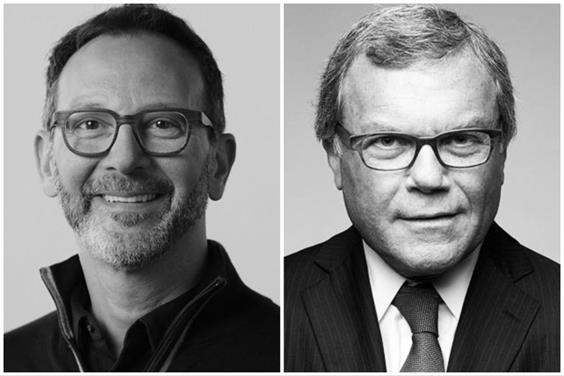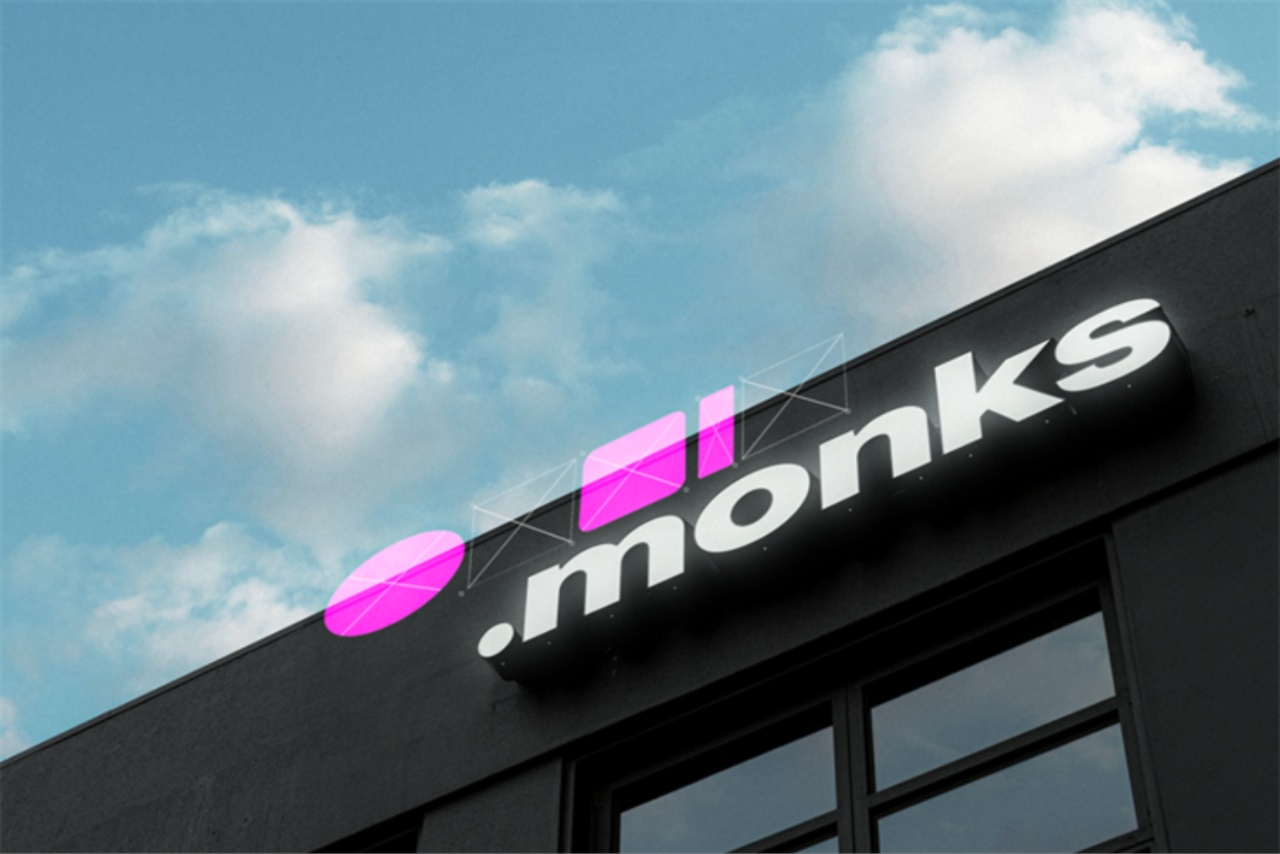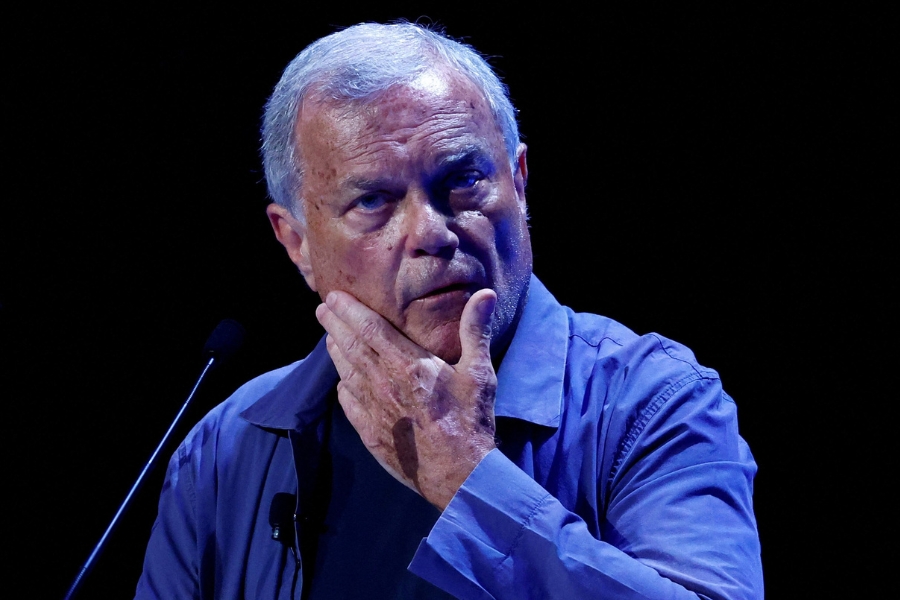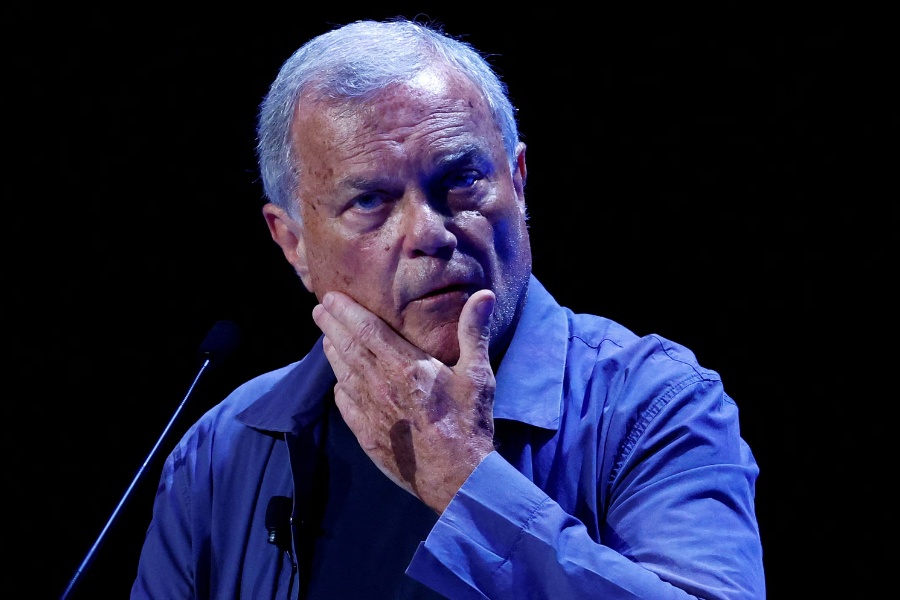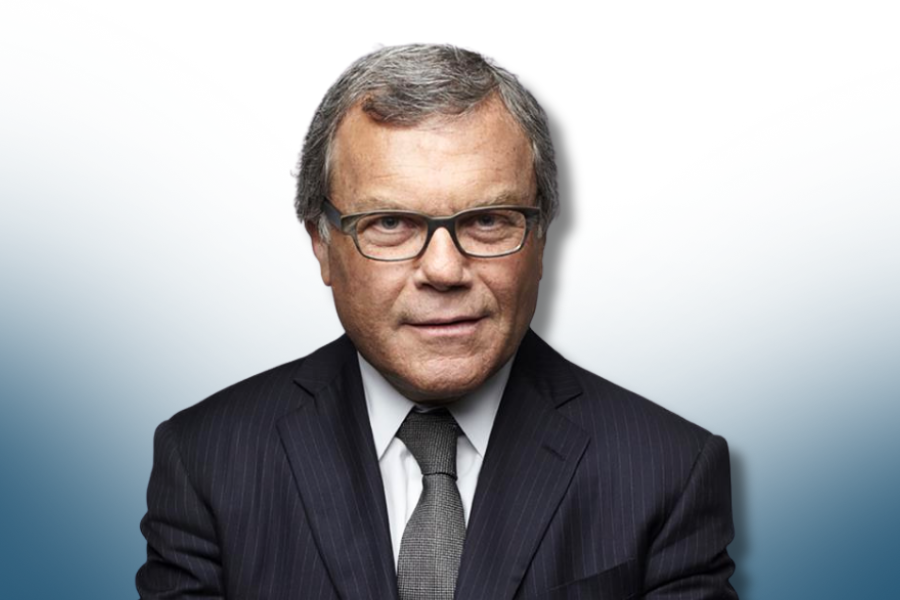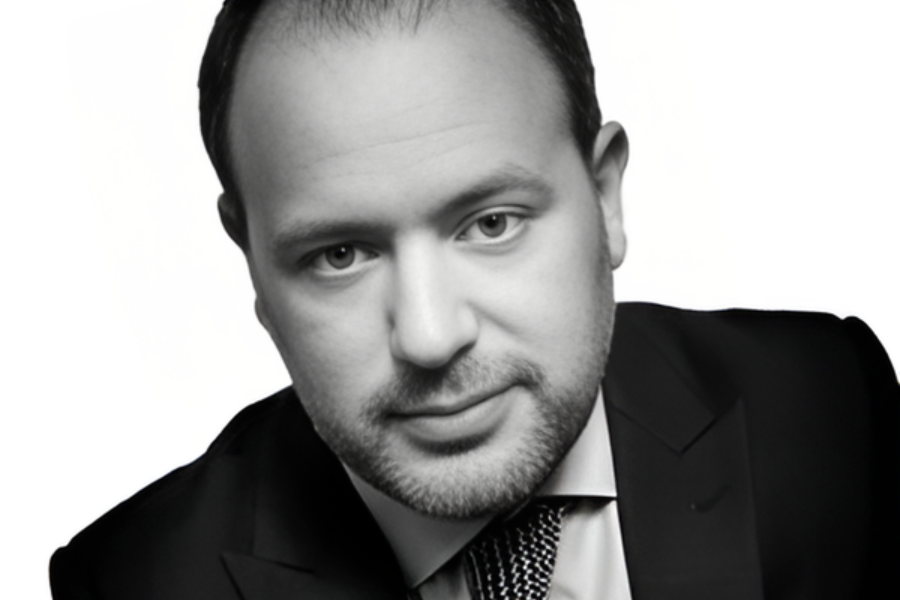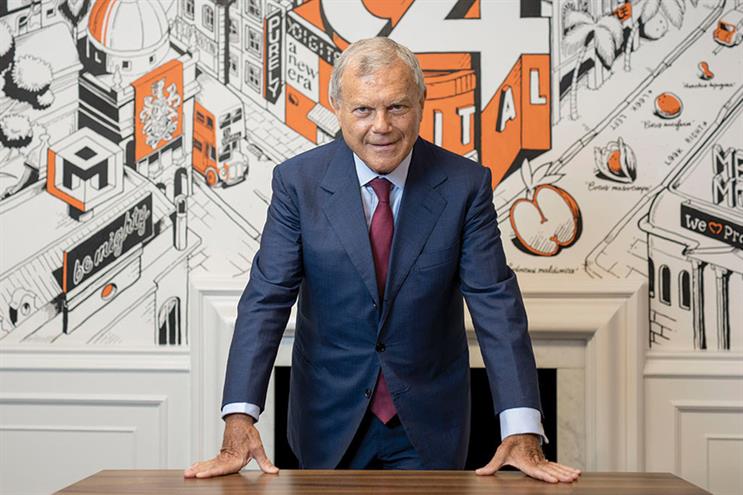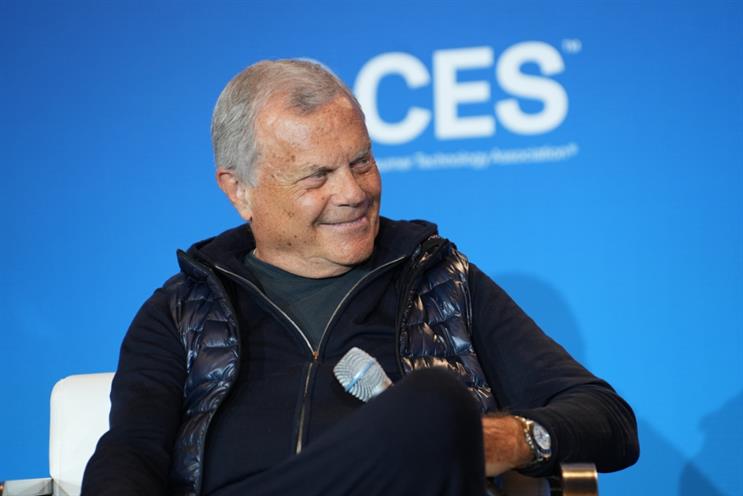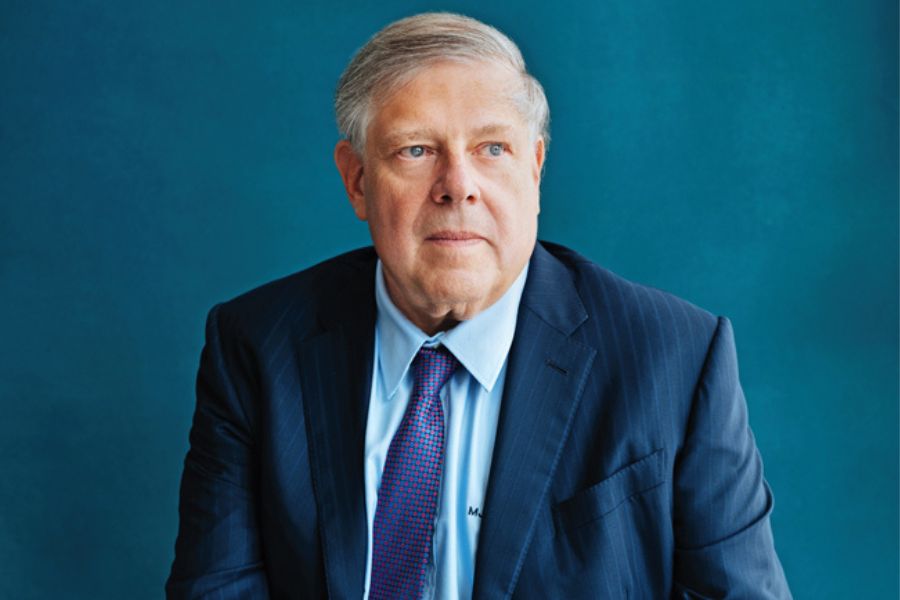Coronavirus has been a nightmare for many advertising chiefs but not, so far, for Sir Martin Sorrell, who cheerfully welcomes Campaign into his London office around the corner from the Ritz Hotel.
A brass nameplate on the exterior of the Georgian townhouse announces the name of his new company, S4 Capital PLC, in the same kind of reassuringly traditional typeface that WPP used outside Sorrell’s old office in Farm Street.
The only other occupants of the small, third-floor space that Sorrell leases from his friend, Lord Rothschild, are two assistants and his dog, Ferus, an Irish red setter sporting a Louis Vuitton collar.
Ferus did not come into Farm Street because there were “too many people” but Sorrell, who is being divorced by his second wife, Cristiana Falcone, says he likes to bring his dog into S4 Capital’s office.

Sorrell, who turned 75 this year, looks deliberately youthful in sweatshirt and trainers. He feels “better” because he has not travelled for work since March. The eight key people who run S4 Capital are spread around the world, chiefly in Holland, with only Sorrell in London. They have a daily video call.
It is a big change from his WPP days when he established himself as the dominant voice in global advertising because he had built the world’s biggest agency group and he spoke and travelled everywhere.
His departure as chief executive after 32 years, in April 2018, was spectacularly messy. The board investigated an allegation of personal misconduct and whether he used company money to pay a prostitute. He strenuously denied the claims.
“Let’s be quite clear about this: I decided to go,” he says. “I mean there was no way they could fire me. That was the big problem for the board—what they could do about this contractually. I decided to go because [of how] I felt [chairman Roberto] Quarta and the board had handled it.”
Since then, Sorrell has made a remarkable comeback. He founded S4 Capital, a self-styled, “new era” marketing services company, six weeks later and reversed it into a “shell” company on the London stock market. He was following the same playbook that he used in 1985, when he was group finance director of Saatchi & Saatchi and identified WPP as a vehicle for his ambitions.
S4 Capital’s shares began trading in September 2018; two years later, it is a £2bn business. Sorrell, the executive chairman, has bought 16 agencies—merging them as part of a “unitary” structure, rather than operating a holding company with many separate P&Ls.
Covid-19 has barely been a blip. Net revenues rose 12% in the first half of 2020 while revenues at the six agency holding companies, including WPP, declined.
S4 Capital’s stock price has trebled from its low in March and, at the time of writing, is not far off its record high in September. Sorrell maintains S4 Capital has only had to cut freelancers and some jobs “at the margins” because of the pandemic. Animation and turning live events into virtual events have brought “huge” demand from clients, he says.
“It’s not revenge—it’s point to prove”
S4 Capital enjoyed its biggest coup when MediaMonks, its Dutch content production business, won BMW in 26 markets across Europe, including Germany, where it had no presence, in September. “Having a name like Sorrell, who is incredibly well connected, allows him to win clients even when he doesn’t have the capabilities,” one person who followed the BMW pitch says.
There was a minor controversy as MediaMonks appointed Thomas Strerath, a former Ogilvy executive, who advised BMW during the early phase of the pitch, to run the new German operation. BMW said the process followed compliance rules.
Importantly, MediaMonks beat consulting giant Accenture, which has made a big move into marketing services. “The real competition for us is not the holding companies,” Sorrell says. “The real competition for us is Accenture. Our target is Accenture.”
The rest of the industry is watching Sorrell’s return with a mixture of awe and outrage. Michael Levine, an analyst at Wall Street firm Pivotal Research, says: “We view S4 as a unique, pure-play digital asset, with an exceptional management team led by Sir Martin.” Miles Young, a former chairman of Ogilvy & Mather and non-executive director of S4 Capital, says of Sorrell: “It’s as if he has drunk a large potion of a reinvigorating fluid. His spirit is positively youthful—like a bright-eyed but very, very wise puppy.” He is also more of a “team member”, Young adds. “He’s very much a listening Martin.”
Yet Sorrell is a polarising figure. While once fiercely protective of WPP, since setting up S4 Capital, he has become more combative, attacking what he calls the “broken” holding company model and his old firm, in particular. He is infuriating, one senior figure volunteers, using a strong expletive, while also admitting “he is a magician” for building a £2bn company in two years.
Another leading figure questions whether Sorrell’s strategy of focusing 100% on digital—he talks about a “holy trinity” of content, media and data—and M&A is genuinely different, beyond starting with a blank sheet of paper and no legacy operations. “Revenge is not a strategy,” this person says.
Sorrell guffaws at that line: “It’s not revenge—it’s point to prove. Our mission is to build a new age, new era advertising and marketing services model. There is a contiguous objective which is to disrupt the old.”
He didn’t want to retire when he left WPP and hopes he has quite a few more years because of his “mother’s genes”—she died at 97. Sorrell plans an initial “five- to seven-year cycle” at S4 Capital and then another, “if I am compos mentis and everybody wants me to continue. I look at it being a 10- to 14-year exercise for me. That means we’ll have to build a company that is resilient.”
S4 Capital’s big idea: riding the technology boom
Sorrell says S4 Capital is growing because it is allying itself to the world’s biggest tech companies and can help clients to navigate these platforms. Brands want “flexibility” and “agility”, he says. “They don’t want to pay big retainers. They want responsiveness.”
What’s more, many of the tech giants, including Google and Netflix, are clients of S4 Capital. Working with tech clients is “totally different” because “they look at the skies”, whereas more traditional clients look “at their boots”, according to Sorrell. As a result, “we take more risk,” he says. And the tech companies have needed to invest more in digital marketing during the pandemic: “People don’t understand that the tech platforms [used to] sell their products and licences face to face.”
Both Saatchi & Saatchi and WPP rode the globalisation boom in their heyday, Sorrell says, recalling a 1983 article by Theodore Levitt in the Harvard Business Review about the rise of global markets and how Maurice Saatchi had a “Eureka” moment after reading it. Saatchis’ expansion was based on that “core principle” and “WPP was an extension of that”, Sorrell adds.
"On the basis that you don’t think you’re brilliant, that you’re averagely intelligent, if you push on an open door, you’re more likely to win"
If the “geography bucket” was the growth sector at the end of the 20th century, then “the technology bucket” is the place to be now, he says. In a revealing comment, Sorrell adds that he wishes WPP had moved into digital earlier: “In the mid-1990s, WPP started to pivot towards digital—clearly, with the benefit of 20-20 hindsight, not fast enough.”
He devised his “holy trinity” strategy by looking at WPP’s portfolio and identifying three growth areas:
- Digital advertising content (the kind of work produced by AKQA and VML but “not so much OgilvyOne or Wunderman because bits of that were ancien régime”, he says).
- Media (Essence was “probably the best asset” in Group M due to its “transparent” model. This was important because “the ANA, ISBA, WFA” had been asking “are the media agencies ripping us off?”)
- Data (he always looked at Kantar’s Worldpanel data to prepare for a big pitch).
Sorrell says it wasn’t complicated: “On the basis that you don’t think you’re brilliant, that you’re averagely intelligent, if you push on an open door, you’re more likely to win.” MediaMonks, his first deal, focused on digital ad content. Mighty Hive, the next big deal, covered programmatic media and data. Subsequent deals have been in one of those two areas.
There isn’t much evidence that the different parts of S4 Capital—creative, media and data—are working together. Sorrell says there are client examples but declines to name them. Still, S4 Capital’s approach, especially its focus on digital, speed and integration of capabilities, is resonating with clients.
James Thompson, chief beauty and brand officer of Avon, which appointed MediaMonks last year, says: “MediaMonks industrialised the mass production that we needed to do and contemporised it, and they did it in a way that we could afford, was collaborative, and made us better.” MediaMonks has been “agile” and “responsive”, “making stuff for us almost constantly” and helping the beauty brand move from “long-form film” to “lots of different formats”, Thompson says, although Avon has not used Sorrell’s firm for media.
“He offers an integrated, focused proposition without any of the fluff ,” Thompson says, although he has a caveat: “What it misses is the strategy. You have to do quite a lot of that work yourself or supplement it.”
Sorrell concedes that S4 Capital lacks firepower when it comes to strategy and “upper funnel” work. That is one of two focuses for potential expansion—along with systems integration, a traditional strength of Accenture and the other consulting giants. Hence his quip about discussing such matters with Ferus.
“The new age of digital transformation”
Sorrell has got his timing right; the agency sector is in flux as clients seek to move faster, take greater control and join up elements of marketing, commerce, tech and data. S4 Capital is one of many entrants that range from Accenture and Deloitte Digital to upstarts such as You & Mr Jones, Stagwell Group and Fimalac and a raft of small independents.
“The environment has changed,” Sorrell says. “It is 24/7, always-on. The days of briefing an agency and letting them get on with it for two or three weeks, and then rebriefing them [at a later date], those things have gone. You don’t have the time any more.”
Brands must treat communications “like an election campaign”. Consumers “are changing their habits” and are “always online” and new “more disruptive competitors” are entering the market.
Jay Pattisall, principal analyst at research firm Forrester, describes this trend as the “new age of digital transformation”. Speaking at S4 Capital’s investor day in September, he said: “The first age of digital transformation was applying digital to marketing [five or 10 years ago]. The next wave was building experiences [for consumers] and that was very much a system integration exercise. The next frontier for digital transformation is to virtualise the brand’s experience across all of its digital touchpoints and create something unique and different for people to engage with.”
Pattisall calls it “brand virtualisation”. Sorrell admits the phrase doesn’t trip off the tongue but is bullish about the opportunity and quotes Wesley ter Haar, co-founder of MediaMonks. “His view is that the first decade of this millennium was about AKQA, the second was R/GA,” Sorrell says. “And he says that this could be our decade—it is one of the slides in our [new] three-year plan.” He admits rivals “may violently disagree” but “it is up to us to seize it”.
The holding companies are moving in the same direction but critics say they lack the same agility.
David Jones, founder of You & Mr Jones, which claims revenues grew 27% in the first half of 2020, says: “The success and accelerating growth of companies like S4 Capital and ourselves shows how profoundly challenged the traditional legacy businesses are and how massive the demand is from clients for a new digital-first, tech-enabled model.”
Not a holding company?
Sorrell insists it’s not solely a 100% focus on digital that makes S4 Capital stand out. Its unitary structure makes it “different” from “the Saatchi model”, “WPP model” and the idea of a holding company, he claims, referring to the creation of Interpublic by Marion Harper in the 1950s. “They are what I call P&G/Unilever detergent models. You launch your new detergent brand, you know it’s going to cannibalise your existing portfolio to some degree, but you launch it because you get bigger market share.”
Instead, S4 Capital is about “growth”, with a unitary structure, he says. That’s why when he talks to takeover targets, Sorrell says it’s important that they regard it as a merger, rather than an acquisition. He claims every discussion begins with: “If you want to sell your company, we’re not interested, so you might as well finish the conversation now.”
He adds: “If that’s what you want to do, go and talk to Accenture or whatever. We want you to buy in to what we’re trying to build here and disrupt the old.”
One industry figure who has talked to Sorrell about S4 Capital is not convinced: “At the end of the day, it’s a digital, holding company, roll-up business. It’s nothing new. The only difference is it’s digital. It’s all about speed and aggressiveness. When you do a roll-up, you just need to move onto the next thing as quickly as you can [to boost the valuation].”
Lorna Tilbian, chair of Dowgate Capital, a stockbroker that advises Sorrell on his deal-making, disagrees: “It’s not just buy, buy, buy. There are three, big legs of the stool—MediaMonks, Mighty Hive and, to an extent, [in-housing experts] Firewood. They are absolute pillars. A lot of the others have been acqui-hires [meaning S4 Capital was acquiring the talent as much as the business]. All these people are buying in [by turning their equity in their agencies into S4 Capital shares], they’re not selling out.”
Part of the reason agency entrepreneurs are buying in to a unitary structure is that clients need integration, and most holding companies are too “vertical” and siloed, according to Sorrell. “I know horizontality is a banned word,” he says, referring to his former strategy at WPP of trying to get agencies to collaborate, “but it is the problem. You have to create one firm”—like McKinsey or Goldman Sachs.
Competing with Accenture
S4 Capital has a presence in 31 countries—about 70% in North and South America, 20% in EMEA and 10% in Asia-Pacific. “It should be 40-20-40,” Sorrell says. “The functions that we do are the right ones,” he adds, but the balance is “more art” than “science” at the moment. The mix is about 70% content and 30% media and data. “We have to be more science,” he says, in a nod to the consulting firms.
“We don’t compete with the holding companies, really. We compete with parts of them,” Sorrell says, referring to a recent pitch when an S4 Capital team came up against R/GA and AKQA. “We see Deloitte occasionally” but most of the high-end consulting firms such as McKinsey, Bain and Boston Consulting Group “do a different job”, as they focus on strategy. “Essentially, it’s Accenture. They are the competition. When you think about what we’re trying to do, think about us trying to compete with them,” he says.
S4 Capital’s 3,000 staff are “like a pimple on the elephant’s backside” compared with Accenture’s 500,000-plus army, although Accenture Interactive, the digital marketing agency business, probably employs less than 10% of that number.
"The only way forward for the holding companies is some form of break-up"
Sorrell knows how to wind up the competition, describing the consulting giant as “vulnerable” after losing in the BMW pitch. Two of its leading agencies, Droga5 and Fjord, have been “shedding people”, he says, and its collection of rival agencies means it is at risk “of a holding-company problem”. He adds: “There is some suggestion that Julie Sweet, the new CEO, doesn’t really believe—I don’t know whether this is true or not—in Accenture Interactive or the creative piece of it.”
An Accenture spokesman declined to comment but noted it has elevated the role of Accenture Interactive this year, making it one of four core services.
Sorrell’s bearish view of the agency groups has intensified since Covid. “The only way forward for the holding companies is some form of break-up,” he says. “It’s already happened” to an extent, he adds, referring to the sale of Kantar and a management buyout at Finsbury. Omnicom has also aligned some of its smaller agencies with its big networks and Sorrell picked up staff from its fashion outfit, Wednesday. He does, however, give credit to Publicis Groupe, which began pushing its Power of One model five years ago, and says Maurice Lévy, the then chief executive and an old foe, was “right”.
But there is “a dilemma”: relegating the agency brands, rather than selling them off, risks destroying value. “Where is Saatchi now? Where is Leo Burnett? Where is BBH?” he asks. A lot of Publicis’ digital agency brands have already been retired. “Where is LBi, Rosetta, Razorfish? All gone. You have to realise when you do that, you destroy value.”
It is “bloody difficult”, Sorrell admits, having “wrestled” with these questions at WPP. But he chuckles again as he tells of how MediaMonks’ chief executive Victor Knaap “amuses himself by going around the world taking pictures of the foyers of Publicis offices that say ‘Power of One’ [alongside] 25 names [of different agencies also listed on the wall]”.
Further expansion
S4 Capital has already raised £450m in share placings and Sorrell said at the investor day: “We’re only 1% done.” Asked whether that means he plans to build a £200bn company, he says “we’re very ambitious” but “I don’t think there’s any point in saying, if you’re two billion quid, you’re going to be x billion in x years.”
He adds: “If you said to me when I was at Saatchis or at WPP—if we were having the same conversation at the same point in time—‘What are you going to be like in five years’ time?’, I’d say, I don’t know. What we want to do is to create this new way of doing things, so Campaign’s headline is: ‘This is the new model’ or ‘They’ve proven there’s a new way of doing it.’ That’s the fundamental purpose.”
WPP’s launch is still vivid in Sorrell’s mind as he recalls the importance of “serendipity” and using his banking contacts when he and his partner, Preston Rabl, persuaded the company Wire and Plastic Products to accept their offer to become major shareholders. “We didn’t necessarily want to reveal all our plans, partly because maybe we didn’t really have a very big, detailed plan,” Sorrell says. Yet he had an overarching idea about the rise of globalisation, just as he has now with the growth of technology, and bought JWT within two years.
Sorrell didn’t start S4 Capital with a masterplan beyond the “holy trinity”. He hadn’t given any thought to starting over before “14 April”, he says, referring to the date he stepped down from WPP—at 10pm on a Saturday. “Everybody thinks that you sit there and you plan these things meticulously—or maybe they don’t. The answer is you have a general framework, you take the blank sheet of paper and jot down the three pieces you’re interested in. You formulate an overall approach, and then MediaMonks and Mighty Hive followed pretty quickly. And then it snowballs.”
Client work has included HP, Nike and Reporters Without Borders (pictured, below) in the past 12 months.

Sorrell’s new three-year growth plan has an ambition to double revenues organically without acquisitions—“a 24% compound growth rate”, he notes. He could make a lot of money by 2023 because he owns about half of the so-called incentive shares.
S4 Capital needs to grow above an annual compound rate of 6%, and the incentive shares will pay out 15% of the uplift. Numis Securities estimates the “theoretical” value of those shares could be £162m. Half might go to Sorrell, who previously collected some huge payouts from a controversial WPP bonus scheme, including £70m in 2015. “We’ll see what happens. I don’t want to speculate,” he says.
The ownership of S4 Capital might be another flashpoint one day because Sorrell has a special share that gives him super-voting rights—just like the founders of Alphabet and Facebook. Asked whether that is storing up a future problem at S4 Capital, he chuckles: “I would like to have that problem”—a reference to the astronomical value of the tech giants.
“Obviously, if you have a lunatic in control, you have a problem,” Sorrell concedes, but he maintains family or controlled companies can often be “better run” and act “more in the long-term interest of all the stakeholders” because the manager is a share owner. “When you wake up in the morning, you should have your heart in the mouth. It’s not a nine to five job. It’s the Bill Shankly stuff,” he says, in reference to the Liverpool FC manager who said football is not about life and death, it’s far more important than that.
But what happens to S4 Capital when Sorrell is no longer there? “At the moment, there are eight people that meet every day. It’s a very strong team—as good as anything I’ve seen,” he says, while acknowledging “there are really good people at WPP” and “there was a really good team in the early days of Saatchis”. He predicts “the succession” at S4 Capital “will come from that” group, who include Knaap and ter Haar of MediaMonks, Pete Kim and Chris Martin of Mighty Hive, and Scott Spirit, formerly of WPP.

WPP is still “my baby”
When Sorrell left WPP, he memorably said: “WPP will always be my baby.” Does he still feel that way? “Yes,” he laughs.
Ahead of this interview, the question most ask is why he has kept his WPP stake of nearly 2%, worth about £150m. Sorrell offers various answers: “Starting a business is as near a man can get to having a baby—not physically but mentally,” he says—a favourite line. Then he talks of how “collecting is a sickness” and “the trouble with collectors is they never sell anything—there is an analogous thing here”.
But if Sorrell is out to disrupt the old, why hold on to a stake in a company that he claims is out-moded? “There’s value there, but they should break it up. Group M, operating on its own, under Christian Juhl’s leadership, would be far better than being part of WPP. Burson Cohn & Wolfe would be far better under Donna Imperato, operating as an individual unit. VMLY&R would be far better under Jon Cook, running as an individual unit.”
Sorrell claims that WPP’s current management, led by Mark Read, his former protégé, keeps adding “central staff” and the overall structure is becoming “more and more vertical”. They are “bozos” for selling some assets cheaply, he says.
That raises another question: why is Sorrell so unkind about WPP and, by implication, the tens of thousands of people who used to work loyally for him and are trying to get on with turning around the business he left? “All fair in love and war, I guess,” he replies, without sounding convincing. “What we’re getting at is the mistake that the chairman and the board made [when he departed in 2018].”
Sorrell repeatedly knocks WPP. Whenever S4 Capital issues a stock market announcement, it includes a footnote about how much WPP’s stock market value has fallen since he left—it has roughly halved from £16bn to £8bn. It’s only “the editorial notes” and “it’s factual”, Sorrell chuckles.
Isn’t it designed just to “eff” off WPP? “No, it’s not.” In that case, Campaign suggests, the notes should point out that Sorrell built WPP into a £24bn company and presided over an £8bn decline in value in his final year in charge when revenues went into reverse. But is it really necessary for him to mention WPP’s fortunes at all? “From my point of view, yes,” he says, giving another long laugh. “Just to set the record straight.”
Some observers wonder whether Sorrell’s bitterness masks a secret desire to take over WPP. S4 Capital’s size means it can do bigger deals. “There are things that you could do, but it has to be in the strategic framework of what we’re talking about,” he says. “It can’t be when people speculate about the holding companies, it can’t be that. It has to be something that is built around the holy trinity—digital-only, faster, better, cheaper, unitary structure, we’re not going to be expedient about that. If you think about what I said in relation to Accenture—upper-funnel stuff, systems integration—that’s more the direction.
One old Sorrell ally says: “Martin doesn’t want to buy WPP. He just wants the two valuations to cross”—in other words, for S4 Capital’s stock market value to surpass that of WPP.
“Things have changed”
With hindsight, 2016 looks like a turning-point in Sorrell’s world. WPP reported record results but Brexit and Donald Trump’s election victory signalled an end to relentless globalisation. It was also the year when an ANA investigation found “non-transparent” practices were pervasive in US media agencies, and clients tightened up contracts. “Nothing came of the investigation,” beyond some scrutiny of Havas, Sorrell points out. Asked whether it affected subsequent financial performance, he says: “Probably that was part of the pressure.”
He points out other factors came to a head around 2016. The tech platforms made the walls of their walled gardens “even higher”, because of brand safety, privacy and election interference, and a lot of clients embraced zero-based budgeting as they struggled with digital disruption.
“The juxtaposition of those two things resulted in the rise of one-to-one and 24/7, always-on marketing” and brands “wanting to take back control”, he says. One example is telecom company Sprint, which built an in-house digital media agency and hired Mighty Hive (before it joined S4 Capital) for support and consulting. It is now a Harvard Business School case study in how to speed up working and drive efficiencies.
Looking ahead, Sorrell believes “Covid has accelerated digital transformation” because of the sudden increases in online shopping, remote working and so on. Clients are now looking to implement their 2024 plans in 2021, he says.
Byron Sharp, marketing professor and author of How Brands Grow, has warned against “charlatans” suggesting everything is changing because of the pandemic. Consumers “liked their lives before” Covid and are likely to return to old habits, he claims. “I wouldn’t agree,” Sorrell says. “Things have changed.” And he is upbeat about 2021, saying an economic “rebound” could be “potentially huge”.
The creation of S4 Capital is certainly proof of his capacity for reinvention. Whether he has the last laugh will depend on how the Sorrell story ends. Everything about his career to date suggests more plot twists lie ahead.
S4 Capital: Inspired by his family—but no succession
Sorrell named S4 Capital for four generations of Sorrells, starting with his two grandfathers. It should be S5, he says, because he has grandchildren.
Sorrell grew up in north London and studied at Cambridge University and Harvard Business School. It was his father who inspired him to go into the advertising business and set up his own company. “My dad had said find an industry you enjoy and have fun and then find a company within that industry that you enjoy and have fun and then build a reputation,” he says. “Then, once you’ve built a reputation, if you wanted to start your own business, go off and do that.”
Sorrell’s father was one of six children from Ukraine—the family moved to London’s East End in about 1899—and he “always worked for somebody else”. That was a shame because “he was so clever and intelligent”, Sorrell reflects. “He should have had his own business.”
The pair were “very, very close”—sometimes talking five or six times a day—and yet they never went into business together, even though they considered it in the early 1970s.
“We didn’t manage to work it out,” he reflects. “It was very strange.”
S4 Capital is practically a family-controlled business, given Sorrell’s special super-voting rights, but he can’t imagine his three grown-up sons—all high-fliers in finance—wanting to succeed him.
“They’ve gone their own way,” he says, adding succession in a family business can be “very difficult” and pointing to Rupert Murdoch’s clan.
Sorrell’s obsession with empire-building has come at a price. His estranged wife, Cristiana Falcone, speaking about their divorce in The Sunday Times in October, described him as “a genius” and “very charming” but she felt she “lost her identity” during their marriage.
They have a four-year-old daughter, born on the day of the US Presidential election in 2016. Being a father again is “delightful”, although “you’re never good enough”, Sorrell says.
Getting the right “balance”—the “three circles” of family, society and career—is “very difficult”, he admits. “I haven’t been able to balance all three.”

